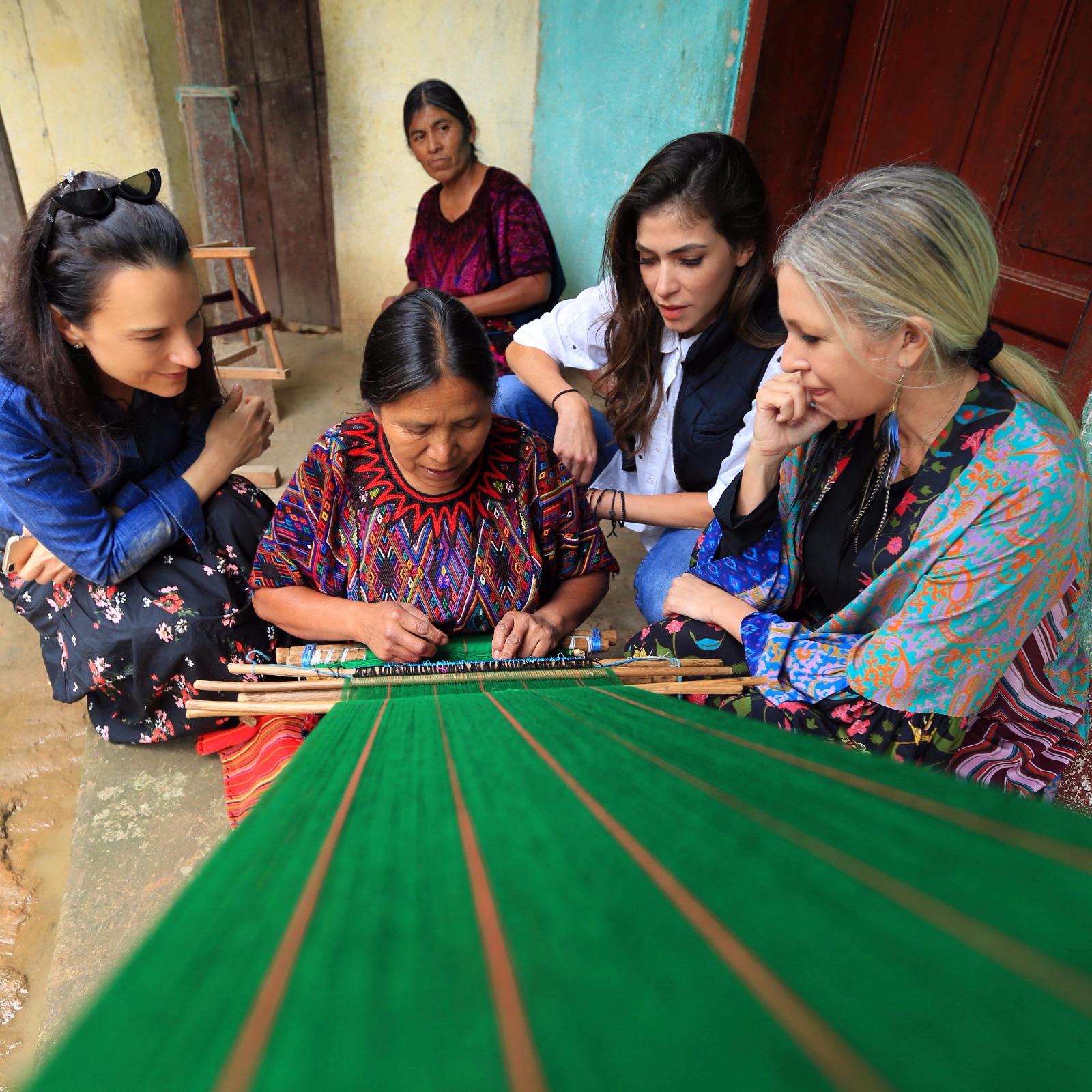On her most recent trip to Guatemala, Carmen spent some time with non-profit leaders Marianne Hernandez of Pacunam, and Celina de Sola of Glasswing International, to focus on a number of social development initiatives in the heritage-rich Central American country. Chiefly, social investment in communities that live in the Maya Biosphere Reserve (an area of 21,602 km²). The area’s needs are many, but there is a particular focus on cultrual preservation, social investment and the prevention of environmental degradation. The latter is a primary obstacle to long-term development in Latin America. Since the 1970s, development planners have advocated a variety of conservation models in Latin American countries to protect remaining wilderness areas from degradation and depletion.
Marianne and Carmen observe the work of a local artisan in Guatemala.
Founded in 2006 by a group of visionary corporations, Pacunam is committed to the preservation of Guatemala's natural and cultural heritage. The non-profit organization, which is headed by Carmen’s friend Marianne Hernandez, is behind the recent discovery of about 60,000 homes, palaces, tombs and highways in the humid lowlands of northern Guatemala, a project that began in 2015 and has since, using laser technology, uncovered tens of thousands of structures built by the Mayan people over a millennium ago. In addition to providing financial support for the study and protection of such strategic archaeological sites, Pacunam is also committed to developing the Carmelita-Mirador route as a sustainable tourist circuit to provide revenue for local communities; supports the Conservation Incentive Program in local communities in order to make biodiversity conservation a viable choice for users of local resources; and encourages international cultural exchanges through events, seminars, conferences, workshops, and exhibits.
Carmen visiting one of the Glasswing Community Schools in Guatemala.
For the past four years, Marianne has dedicated herself full-time to non-profit efforts in sustainable conservation and the arts, but prior to her work in this sector she spent twenty five years in international corporate finance. During her ten year tenure as an investment banker in New York City she headed Lehman Brother’s efforts for Colombia and Venezuela, subsequently transitioning to the corporate side to join a Central American conglomerate of companies in the agro-industrial and energy sectors as a financial advisor to the Board.
Carmen and Celina de Sola, co-founder and vice president of Glasswing International, with local schoolchildren in Guatemala.
Non-profit Glasswing addresses the root causes of poverty and violence by empowering communities and providing children with educational and development opportunities and skills that help them navigate very difficult contexts and thrive - despite adversity. Their programs not only improve school performance, reduce high-risk behavior, and enhance resilience, but also build life skills such as self-confidence, creativity, communication, collaboration, critical thinking, and leadership.
In Guatemala, Glasswing has partnered with like-minded public schools to create a collection of Community Schools, each committed to providing their students with a safer, more supportive and stimulating environment in which to learn and belong. To date, these schools have had a positive impact on over 85,000 lives. As well as facilitating infrastructure improvements and equipment donations enabling students to attend classes in better conditions, the initiative provides access to computers and libraries, and includes life skills training as well as emotional support to help students develop healthy relationships with their families and peers and increase their self-esteem. Students attending one of Glasswing’s Community Schools are three times less likely to drop out, with 92% of children and youth reporting an improvement in their relationships with peers and family, and 85% an improvement in their grades.
Coincidentally, the trip occurred at at time when the New York Times informed that more migrants from Guatemala than from anywhere else are trying to cross the border into the United States, despite warnings about the perils of the journey north. Thousands of people, including entire families, are taking the dangerous trip to seek work and a better life from the western highlands of Guatemala — this same remote, rural and impoverished area, with a largely Mayan-speaking indigenous population. Over 2019, 42,757 Guatemalans traveling as families were either apprehended or stopped at the United States border with Mexico, according to Customs and Border Protection data. (The numbers are rising. Read more here.)
The main drivers of this dramatic migration are extreme poverty and violence, and development projects are needed to looks at sustainability, but also social justice through access to quality basic services and opportunities, such as the ones led by Glasswing.
Celina, Marianne and Carmen, as well as number of humanitarian-minded entrepreneurs such as Livia Firth, Donna Karan and more, have formed a new coalition that focuses on development and long-term sustainability in Latin America. Named the CoutureLab Coalition, as a statement of continuation of Carmen’s initial aims for her CoutureLab project to foster the work of global artisans, the network is pooling resources to create tangible social and environmental change in this very special region. To find out more, email us below.





